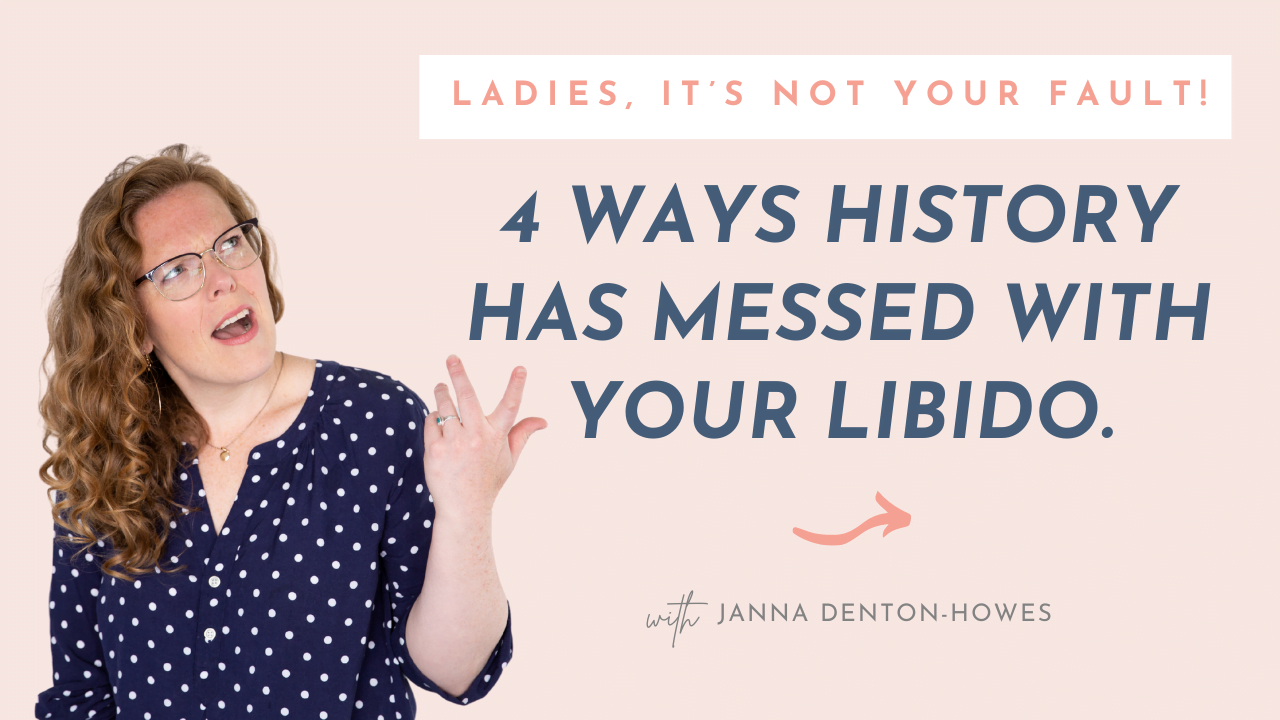I’ve worked with hundreds of women who have been diagnosed with low libido, low sex drive, or hypoactive sexual desire disorder. They all think there’s something wrong with them, and believe there are no other factors in their environment, culture, or relationship that may be contributing. However, what we don’t discuss are the strong cultural messages that directly impact women’s desire for sex and our pleasure within the sexual experience.
Let’s break down four of these historical messages and look at how they still affect women today.
#1: Medically diagnosing sexual desire
Until the 20th century, American and European men (including physicians) believed that women did not experience sexual desire or pleasure. They believed that women were simply fleshy receptacles for male lust. They also believed that intercourse, culminating in male ejaculation, fulfilled women’s erotic needs. If Women displayed sexual desires, the doctors diagnosed them with sexual frustration, which they called hysteria. The treatment for hysteria was for the male physicians to bring the woman to orgasm using their hands. The doctor’s hands must have started getting tired because soon the vibrator was invented to use instead. However, the cultural message that’s still with us today is that it’s not natural for women to experience sexual pleasure. I see this play out again and again in the women I serve who tell me things like:
- I feel weird or awkward.
- I can’t communicate my desire.
- I’m really embarrassed.
- I’m ashamed of my desires and pleasure.
- I have low libido.
It’s no wonder women have felt this way when for centuries! The world told them that they had no sexual desire, and, if they did, it was a diagnose-able condition.
#2: Clitoral orgasms are wrong.
According to Freud, while female children experienced pleasure from the clitoris, adult women had to shift their focus exclusively to vaginal intercourse or risk a psychological disorder.
Let’s set the record straight. Asking a woman to orgasm without clitoral stimulation is like asking a man to orgasm with only testicular stimulation.
The notion is absolute garbage. Yet, I see this ridiculous messaging today when women ask me, “Janna, please teach me how to have a vaginal orgasm. I can only have a clitoral orgasm, so I have to touch my clitoris. I have to use a vibrator.”
The historical message that there is something wrong with you if you need clitoral stimulation is still affecting women today.
# 3: The unbreakable bonds of the marital contract
Men saw women as their property for a very long time and it was extremely problematic for many reasons. Historically, rape was a crime or theft of a man’s property, usually either a husband or a father. That meant the courts didn’t legally recognize rape as damaging to the victim, but instead to her father or husband’s property. Therefore, by definition, a husband could not rape his wife.
“The husband cannot be guilty of rape committed by himself upon his lawful wife for, by their mutual consent in contract, the wife has given up herself and this kind unto her husband, which she cannot retract.”
Marital rape was only criminally recognized in 1970! That’s not that long ago. The messages that still haunt women are…it doesn’t matter what you want. It’s inconsequential what you want. You are the property of your husband, so he gets to do whatever he wants because of your marital contract. Suck it up. You don’t need to be comfortable. You don’t need to be in your pleasure. You’re just a receptacle for his almighty penis.
I see these messages play out constantly in the women I serve. They are riddled with guilt for thinking about their pleasure and are worried about being selfish. They’re terrified to set boundaries to simply feel safe and comfortable 100% of the time.
#4: The patriarchal interpretation of Adam and Eve.
Eve ate the apple. Therefore, Eve committed the original sin and plunged us into war, famine, and all the bad things that happen in this world. Eve’s story infiltrates our culture deeply, especially in the sexual realm, because it teaches women to blame themselves. It’s why we have the diagnosis of low libido, low sex drive, or hypoactive sexual dysfunction disorder in the first place. I have come to realize, after years of research and work in my own life and the lives of over 1000 other women, that women are not low in anything. There is absolutely nothing wrong with us!
The problem is that our culture has mis-educated and misguided us. We are not experiencing 100% safe and comfortable sexual experiences. We have a funky relationship with pleasure. In conclusion, it is incredibly important that we open our eyes to these historical messages and how they affect our libido. The past isn’t in the past. It’s right here with us, in our media, our culture, our society, in the movies we watch, and in the books we read. These messages are still deeply ingrained and entrenched. While this may feel heavy and depressing, the last thing we need is women blaming themselves for their lack of libido. We need to start blaming culture. We need to open our eyes to these messages and recognize how they have harmed us so that we can move forward.
